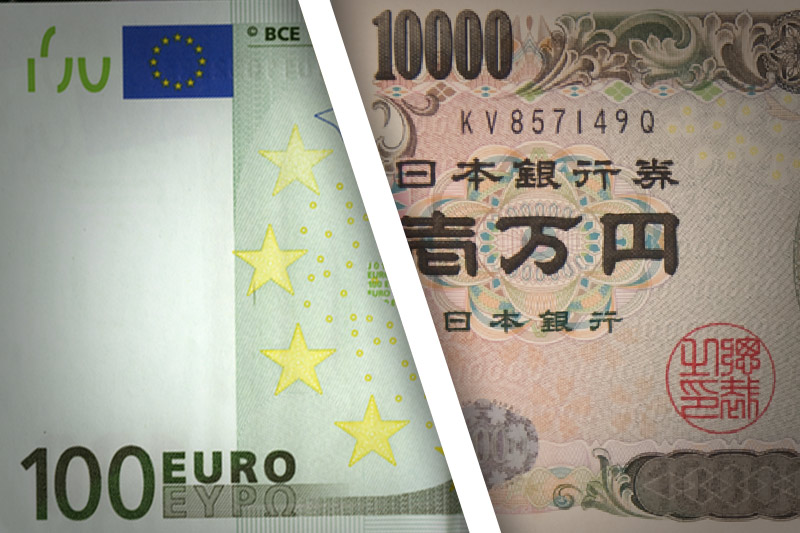Investing.com - The euro dropped against the yen after the E.U. released dismal fourth-quarter economic growth figures earlier Friday.
Then yen, meanwhile, continued to see demand in wake of a Group of Seven statement expressing concern over weakening currencies, which most market players interpreted as a warning to Tokyo to avoid actively devaluing the currency.
In U.S. trading on Thursday, EUR/JPY hit 124.22, down 1.15% and up from a low of 123.81 and off a high of 125.95.
The pair sought to test support at 123.44, last Friday's low, and resistance at 126.94, Tuesday's high.
Eurostat, the statistical arm of the European Union, reported earlier that the eurozone's GDP contracted by 0.6% in the fourth quarter of 2012 from the third, well beyond expectations for a 0.4% decline and far surpassing g the previous 0.1% quarterly contraction.
The dip in total output represented the fastest rate of decline since 2009 and marked a third consecutive quarter of contraction.
The annualized GDP rate fell 0.9%, worse than expectations for a 0.7% contraction, after shrinking at an annualized rate of 0.6% in the previous quarter.
Quarterly French, German and Italian data painted similar pictures.
Germany’s economy, the eurozone’s largest, contracted by 0.6% in the in the fourth quarter, more than an expected 0.5% drop on declining exports and investment.
France’s economy also contracted more than forecast, with GDP contracting by a quarterly 0.3%, while Italy’s economy contracted by 0.9%. Portugal was home to the worst performing economy in the region, with quarterly GDP contracting 1.8%.
The yen, meanwhile, continued to post gains after the Group of Seven nations said in a recent statement that weakening currencies, the yen most notably, must not escalate into active devaluations.
G7 officials have said they believe that all exchange rates are market driven up to now but the yen continued to see demand on Friday.
The yen has taken a major slide in recent months due to greater tolerance for inflation as more pro-growth policies kick in, though Tokyo has not actively devalued its currency.
In Tokyo earlier, the Bank of Japan kept monetary policy and interest rates unchanged in a widely expected decision.
The Bank of Japan also refrained from expanding its stimulus program.
The euro, meanwhile, was down against the pound and down against the Canadian dollar, with EUR/GBP trading down 0.45% at 0.8617 and EUR/CAD trading down 0.82% at 1.3362.
On Friday, investors will pay attention to a G20 meeting of finance ministers.
Also on Friday, the eurozone will publish data on its trade balance, while Spain is to hold an auction of 10-year government bonds.
Then yen, meanwhile, continued to see demand in wake of a Group of Seven statement expressing concern over weakening currencies, which most market players interpreted as a warning to Tokyo to avoid actively devaluing the currency.
In U.S. trading on Thursday, EUR/JPY hit 124.22, down 1.15% and up from a low of 123.81 and off a high of 125.95.
The pair sought to test support at 123.44, last Friday's low, and resistance at 126.94, Tuesday's high.
Eurostat, the statistical arm of the European Union, reported earlier that the eurozone's GDP contracted by 0.6% in the fourth quarter of 2012 from the third, well beyond expectations for a 0.4% decline and far surpassing g the previous 0.1% quarterly contraction.
The dip in total output represented the fastest rate of decline since 2009 and marked a third consecutive quarter of contraction.
The annualized GDP rate fell 0.9%, worse than expectations for a 0.7% contraction, after shrinking at an annualized rate of 0.6% in the previous quarter.
Quarterly French, German and Italian data painted similar pictures.
Germany’s economy, the eurozone’s largest, contracted by 0.6% in the in the fourth quarter, more than an expected 0.5% drop on declining exports and investment.
France’s economy also contracted more than forecast, with GDP contracting by a quarterly 0.3%, while Italy’s economy contracted by 0.9%. Portugal was home to the worst performing economy in the region, with quarterly GDP contracting 1.8%.
The yen, meanwhile, continued to post gains after the Group of Seven nations said in a recent statement that weakening currencies, the yen most notably, must not escalate into active devaluations.
G7 officials have said they believe that all exchange rates are market driven up to now but the yen continued to see demand on Friday.
The yen has taken a major slide in recent months due to greater tolerance for inflation as more pro-growth policies kick in, though Tokyo has not actively devalued its currency.
In Tokyo earlier, the Bank of Japan kept monetary policy and interest rates unchanged in a widely expected decision.
The Bank of Japan also refrained from expanding its stimulus program.
The euro, meanwhile, was down against the pound and down against the Canadian dollar, with EUR/GBP trading down 0.45% at 0.8617 and EUR/CAD trading down 0.82% at 1.3362.
On Friday, investors will pay attention to a G20 meeting of finance ministers.
Also on Friday, the eurozone will publish data on its trade balance, while Spain is to hold an auction of 10-year government bonds.
